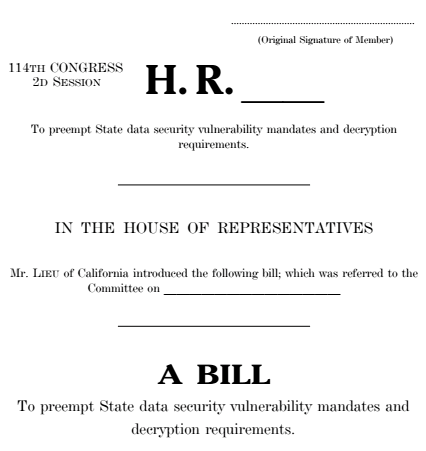A new bill introduced to the House of Representatives could kill state and local bills that seek to undermine smartphones’ encryption measures.
On Wednesday, U.S. Representatives Ted Lieu (D-California) and Blake Farenthold (R-Texas) introduced the “Ensuring National Constitutional Rights for Your Private Telecommunications Act of 2016”, or the “ENCRYPT Act”.
The bill in its entirety reads as follows:
A State or political subdivision of a State may not mandate or request that a manufacturer, developer, seller, or provider of covered products or services—
(1) design or alter the security functions in its product or service to allow the surveillance of any user of such product or service, or to allow the physical search of such product, by any agency or instrumentality of a State, a political subdivision of a State, or the United States; or
(2) have the ability to decrypt or otherwise render intelligible information that is encrypted or otherwise rendered unintelligible using its product or service.
Lieu and Farenthold’s proposed legislation comes just a few weeks after state bills emerged in New York state and California that would ban the sale of smartphones with strong encryption measures.
If passed in time, the ENCRYPT Act could potentially block those bills from being enacted into law.
In a phone interview with Ars Technica on Tuesday, Lieu explained that recent events in part motivated him to sponsor the legislation:
“It’s very clear to me that the people who are asking for a backdoor encryption key do not understand the technology,” he said. “You cannot have a backdoor key for the FBI. Either hackers will find that key or the FBI will let it get stolen. As you saw it the [Department of Justice] just got hacked. The [Office of Personnel Management] got hacked multiple times. If our federal government cannot keep 20 million extremely sensitive security records, I don’t see how our government can keep encryption keys safe.”

The bill has largely received praise from privacy advocates, though some feel that its language could go further in establishing the importance of encryption on smartphones.
The proposed legislation will need to pass in both the House of Representatives and the U.S. Senate as well as receive the signature of the President in order to be enacted into law.
Via: tripwire




Leave a Reply